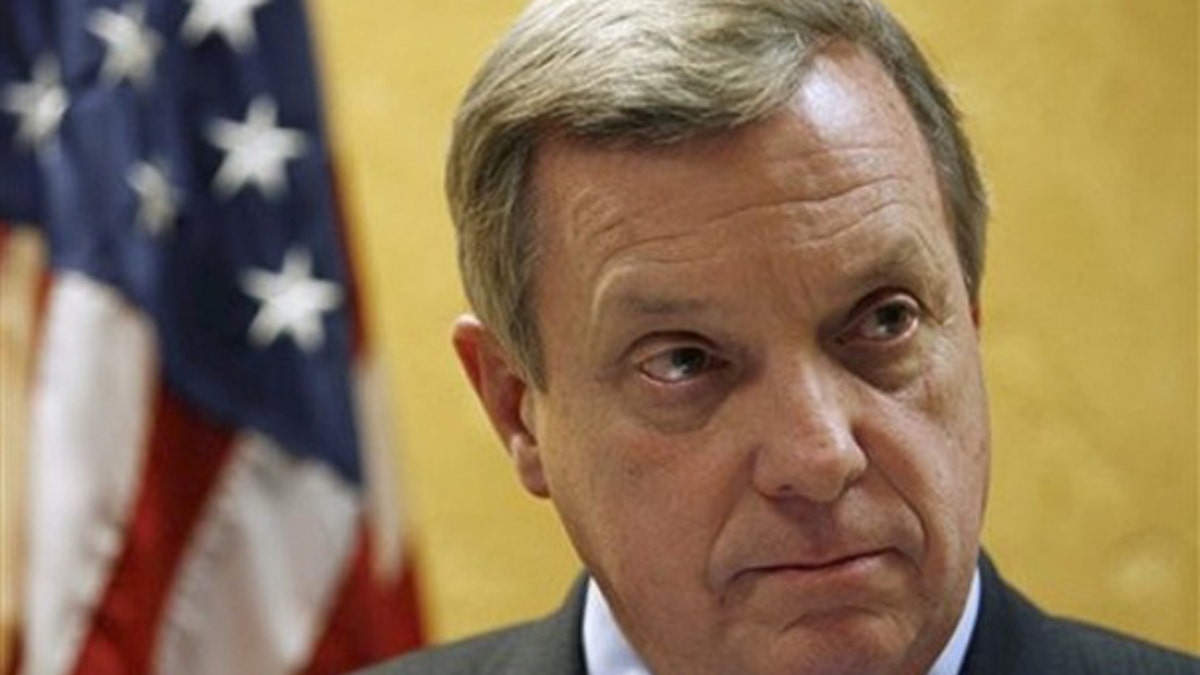
In this Jan. 9, 2009 file photo, Sen. Dick Durbin talks with reporters in Chicago. (AP Photo)
A top Senate Democrat for the first time Tuesday acknowledged that the party is prepared to deal with health care reform by using a controversial legislative tactic known as the "nuclear option."
With Republican Scott Brown seizing victory in the Massachusetts special election for U.S. Senate, Democrats are under pressure to quickly pass health care reform before he arrives -- since Brown will break the party's 60-vote, filibuster-proof majority.
Even before polls closed, Senate Majority Whip Dick Durbin, D-Ill., said "there are options to still pursue health care."
Durbin, the No. 2 Democrat in the Senate, outlined a combination of tactics to get what his party wants out of health care reform.
First, he said the House could simply approve the Senate bill, sending it straight to President Obama's desk.
Then, Durbin said, the Senate could make changes to the bill by using the nuclear option, known formally as "reconciliation," a tactic that would allow Democrats to adjust parts of health care reform with just a 51-vote majority.
"We could go to something called 'reconciliation', which is in the weeds procedurally, but would allow us to modify that health care bill by a different process that doesn't require 60 votes, only a majority," Durbin said. "So that is one possibility there."
Though House Democrats have major misgivings about the Senate version, House Majority Leader Steny Hoyer on Tuesday suggested they'd be willing to consider approving the Senate bill intact, if the alternative is no bill at all. A majority of Democrats in that chamber are opposed to many provisions in the Senate-passed bill, including the controversial tax on high-cost insurance plans which the unions are vehemently against.
House Speaker Nancy Pelosi also expressed confidence Tuesday.
"We will have a reform bill," she said.
Though Democrats, including Durbin, have previously insisted reconciliation would not be used, key aides have quietly pointed to a change in circumstances with the unexpectedly competitive race in Massachusetts.
But reconciliation is not easy under any circumstances. Any measure that is passed under the process requires 51 votes for passage, but that measure's authors must pass strict legislative tests to show the bill deals only with taxes and spending to bring the legislation in line with the budget -- a move that its creators made back in 1974 to keep extraneous provisions from being passed under this expedited process.
Reconciliation might allow for Democrats to modify the excise tax, but it would not appear to allow for changes to abortion and immigration language, among some of the hot-button issues.
Republicans have decried the use of reconciliation for such a massive re-ordering of the nation's economy. To be sure, Republicans were the first to use the tactic outside its intended purpose, and they have used it most often for tax relief, but they say health care reform is different.
Sen. Judd Gregg, R-N.H., the primary point person in the Senate for reconciliation matters as the top Republican on the Budget Committee, has called this "Chicago-style politics" and has vowed to raise scores of objections, called "points of order." There are about 13 different ways Republicans can challenge Democrats, and nearly all of these will require votes.
Durbin, in Chicago, said Democrats "haven't given up on finding other options. I hope some of the Republican senators who have at least been in conversations with us in the past will join us in passing health care reform."
But that's not too likely. Senate Majority Leader Harry Reid, D-Nev., could possibly have pushed away the only Republican in that chamber, moderate Olympia Snowe of Maine, open to working with the Democrats on health care. She told The New York Times that she had "no intention of ever working anything out," calling it "a waste of time dealing with her."
Under the current process, negotiators are trying to hammer out a compromise that both chambers would still have to vote on. But if Brown wins, this laborious process could drag on past his swearing-in ceremony.












































